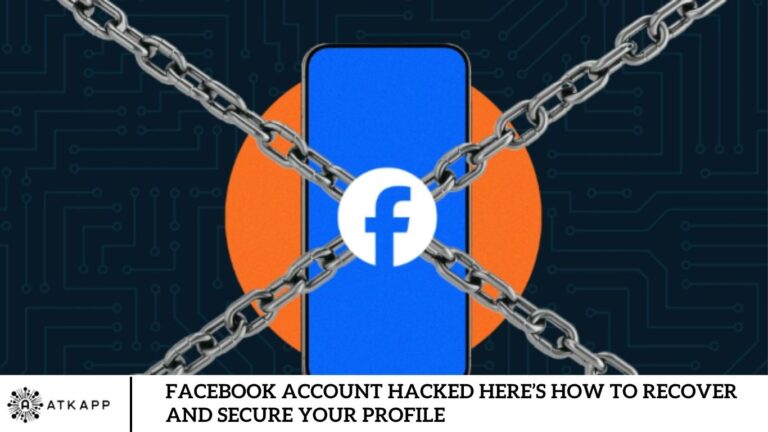Facebook account is more than just a place to share memes and post vacation pictures it’s tied to your identity, your contacts, your memories, and, in many cases, your business. With over 3 billion monthly active users, Facebook has become a lucrative target for hackers. If your Facebook account has been hacked, don’t panic. This comprehensive guide will walk you through the process of recovering a hacked Facebook account, protecting your data, and preventing future intrusions.
Common Signs Your Facebook Account Has Been Hacked
Knowing the early warning signs is crucial for a quick response. Here are some red flags that your Facebook account may have been compromised:
- You can no longer log into your account.
- Friends are receiving spam messages from your profile.
- Posts are being made that you didn’t write.
- Your email or password has been changed.
- Unauthorized login alerts from unfamiliar devices or locations.
How to Recover Your Hacked Facebook Account
Try to Log In
First, attempt to log into your Facebook account the usual way. If you still have access:
- Go to Settings & Privacy > Settings > Security and Login.
- Review all devices and log out of any suspicious accounts.
- Change your password immediately.
Use Facebook’s Account Recovery Page
Visit the Facebook Help Center recovery page:
Follow the prompts, and Facebook will guide you through recovering your account using the following:
- Your email address or phone number.
- Answering your security questions.
- Identifying friends in tagged photos (in some cases).
Report the Hacked Account
If the above steps don’t work, report your account as compromised:
- Go to: https://www.facebook.com/hacked
- Click on “My Account Is Compromised.”
- Enter your email address and phone number, along with your current or old password.
Secure Your Email Account
Hackers often try to access your email associated with Facebook. Immediately change your email password and enable two-factor authentication (2FA) to prevent further attacks.
What to Do If Your Recovery Options Have Been Changed
Sometimes, hackers change your recovery email or phone number. In this case:
- Use “No longer have access to these?” during the recovery process.
- Provide an alternate contact method.
- Upload a government-issued ID if prompted (this helps Facebook verify your identity).
How to Strengthen Your Facebook Account Security
Once you recover your account, it’s essential to secure it to prevent future hacks.
Enable Two-Factor Authentication (2FA)
Go to Settings > Security and Login > Use Two-Factor Authentication
Choose to receive a code via SMS or use an authentication app, such as Google Authenticator.
Review Connected Apps and Devices
Hackers often exploit third-party apps.
Visit Settings > Apps and Websites, and remove any unfamiliar or unnecessary apps.
Change Passwords Frequently
Use a strong, unique password for your Facebook account. Avoid using the same password across multiple platforms.
Update Contact Info
Ensure your email address and phone number are up to date to facilitate future account recovery.
Why Do Hackers Target Facebook Accounts?
Understanding motives can help you better protect yourself. Common reasons include:
- Spamming: Hackers use accounts to send scam links to friends.
- Phishing: Stealing personal info for identity theft.
- Financial Gain: Access to linked payment information or business accounts.
- Revenge or Harassment: Especially in cases of relationship fallout or workplace conflicts.
What to Do If Friends or Business Pages Are Affected
If your hacked account is sending spam or suspicious messages:
- Inform your contacts: Post a status update (after recovery) or ask a friend to warn others.
- Check Facebook Business Manager: If you manage Facebook pages or ad accounts, ensure that no unauthorized changes have been made.
Preventive Tips: Stay Safe on Facebook
To avoid future hacks, follow these best practices:
- Never click on suspicious links, even from friends you trust.
- Avoid public Wi-Fi when logging into Facebook.
- Don’t share your login credentials with anyone.
- Regularly monitor your login activity in Security and Login settings.
Frequently Asked Questions
How can I tell if my Facebook account has been hacked?
If you notice unusual activity, like posts you didn’t make, messages you didn’t send, or your password/email being changed, your account may be compromised.
What should I do immediately after my Facebook account is hacked?
Go to facebook.com/hacked, follow the prompts, and secure your account. Additionally, change your email password and enable two-factor authentication (2FA).
Can I recover my Facebook account if I don’t have access to my email or phone number?
Yes. Use Facebook’s recovery page and choose the option “No longer have access to these?” You may be asked to verify your identity using an ID or through a friend.
How long does it take Facebook to recover a hacked account?
Recovery time varies. It can take anywhere from a few hours to several days, depending on the verification method and the complexity of the case.
What if the hacker has changed my email and phone number?
Use the recovery form at facebook.com/hacked and choose alternative verification methods. Facebook may allow you to upload a photo of your ID to confirm your identity.
Is it safe to upload my ID to Facebook during the recovery process?
Yes. Facebook uses encrypted systems to protect your ID and only uses it for account verification purposes.
Conclusion
Having your Facebook account hacked can be a stressful and overwhelming experience, especially when your data, photos, and connections are at risk. However, with swift action and the proper recovery steps, you can regain control of your account and secure it against future threats. Whether it’s through changing your password, enabling two-factor authentication, or reporting suspicious activity, proactive measures are key. Stay informed and cautious, and regularly review your account settings to ensure your online presence remains safe and protected. Remember digital security is not optional; it’s essential in today’s connected world.

